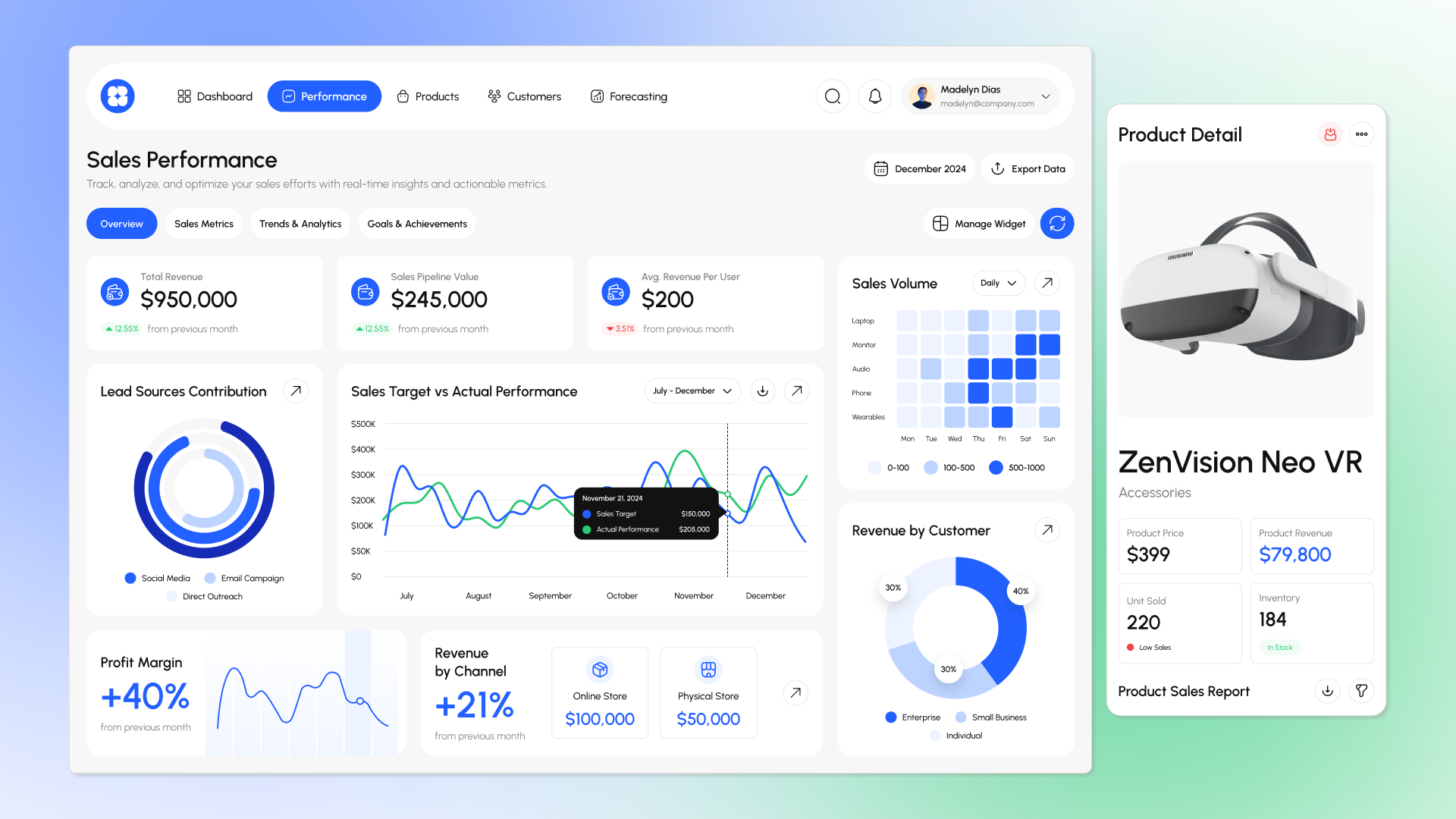
Modern marketplaces are not just platforms for selling goods, but full-fledged ecosystems that dictate new rules for doing business. Digital storefronts hide complex ranking algorithms, dynamic prices, logistical puzzles, and fierce competition. The winner here is the one who knows how to effectively manage processes, update balances faster, analyze demand more accurately, and automate customer interaction. A CRM system for marketplaces turns chaos into a manageable system, allowing the seller not only to survive but also to grow confidently in rapidly changing market conditions.
AVADA MEDIA is your strategic partner from whom you can order the development of a CRM system for marketplaces and the adaptation of ready-made solutions for specific goals and objectives. Our programs provide full automation of sales on marketplaces, helping sellers work more efficiently, reduce operating costs and scale their business without losses. Thanks to integration with leading marketplaces and flexible customization, they can respond quickly and competently to market changes.
A CRM system for marketplaces is a program for managing trade on such online platforms as Prom, Rozetka, eBay, Amazon, and other aggregators. Unlike universal and template management systems focused on working with customers, this system focuses on:
The program for working with marketplaces will become the central point of management of your commodity business. It will provide an opportunity not only to control current processes but also to forecast demand, analyze the effectiveness of commodity items, and quickly adapt to changes.
A CRM system for the commodity business takes over a number of key processes, creating a single space for effective trade management.
Centralized order management
A program for managing marketplaces collects and organizes information about customers, orders, products, and sales from different marketplaces in one place. For example, if a seller works with several marketplaces at the same time, they have to process orders through different personal accounts. CRM allows you to combine all orders in one window, automate their processing, and track their status in real time.
Assortment management
The product aggregator management system itself monitors balances, updates product information, and manages prices and promotions. When the same product is sold on different platforms, it is important that the balances and prices are updated automatically. If the product is sold on Prom, the CRM system for the commodity business will instantly update the balances on Amazon and other platforms to avoid overbuying or losing customers due to lack of goods.
Automatic order processing
CRM system for the commodity business provides effective sales management on marketplaces. Automatically receiving information about new orders, the program distributes them by status, generates shipping documents, automatically generates invoices, sends data to delivery services, and tracks shipment statuses. For example, if the seller uses FBS (Fulfillment by Seller), the system will help control the timing of the shipment, and if FBO (Fulfillment by Operator), it will take into account the balances in the marketplace warehouses.
Advanced sales analytics
The system collects sales data, helps identify trending products, forecast demand, analyze profitability and effectiveness of various pricing strategies. For example, CRM records that a certain product sells better during certain hours and sets up dynamic price changes during this period.
Automation and personalization of communications
CRM allows you to automate sending notifications to customers about the status of orders, offer bonuses for repeat purchases, collect reviews, manage reviews and ratings, and remind you to complete an order. It also helps to personalize communication with customers based on their preferences and purchase history.
Integration with other systems
A customized CRM for a marketplace is capable of seamless integration with various services: logistics platforms, payment gateways, accounting systems, and advertising tools.
Pricing management
CRM helps to set up dynamic pricing depending on demand, competitors, and seasonality.
Full customization
A CRM system for a marketplace is developed taking into account the specifics of a particular business and processes data according to unique rules. Your individual program can automatically prioritize orders from certain marketplaces, combine them by customer, or take into account special delivery and return conditions.
Differentiation of access rights
Thanks to flexible interface customization and access rights restrictions, each employee sees only the functions and data that he or she needs in CRM. The sales manager has access to information about customers and orders, the logistician to routes and warehouse balances, and the management to full analytics. In such a system, you can create your own fields, filters, templates, and save the usual format of work.
Reliable data protection
Each element of the CRM system is protected in accordance with modern security standards. Multilevel verification helps prevent unauthorized access: employees log in with a login and password or use two-factor authentication for additional protection. All data transmitted to the system is encrypted using SSL and AES protocols, which guarantees the security of its storage and transmission.
Multilingual and multicurrency
Your CPM for marketplaces can support multiple interface languages and different currencies, allowing you to expand your business without technical limitations. You can sell goods simultaneously on Ukrainian, Polish, and German marketplaces and keep analytics in a convenient format. Automatic currency conversion, adaptation of documents and messages to a specific region – these options help you to master new markets faster.
Multi-brand accounting structure
If a company works with several brands or stores, CRM allows you to keep separate records of them, but with a single control center. This is convenient for generating reports, setting up pricing policies, and managing the assortment within each brand. The multi-brand structure helps to avoid confusion, monitor the effectiveness of each area, and simplifies the company’s development of new niches.
Scalability
As your business scales, the CRM system adapts without any problems: you can quickly connect new marketplaces, your own websites, or offline points of sale to it. You do not need to manually rebuild your work – all orders will be collected in a single system with convenient logistics and control. With a customized CRM system for marketplaces, your business is always ready to grow without wasting time and resources on adaptation.
System performance
Individual development allows you to create a CRM for a marketplace, taking into account the growth of workload and order volumes in the future. A high-quality software product will work stably even with a sharp increase in the number of users, products, or transactions. The architecture of the system allows you to flexibly expand the functionality without failures and long pauses for revision.
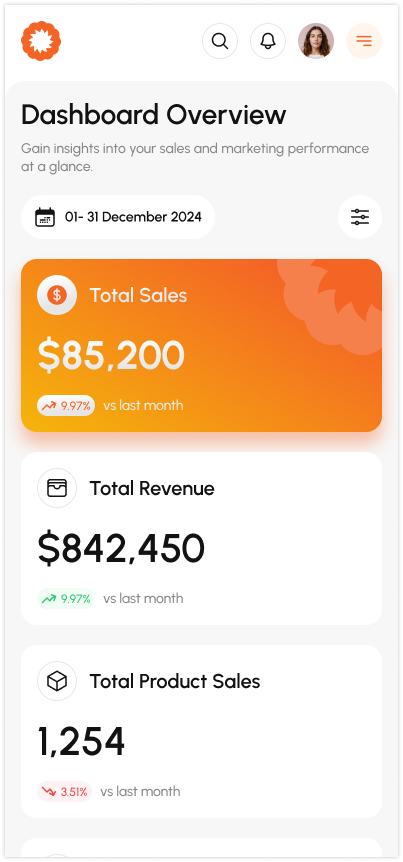
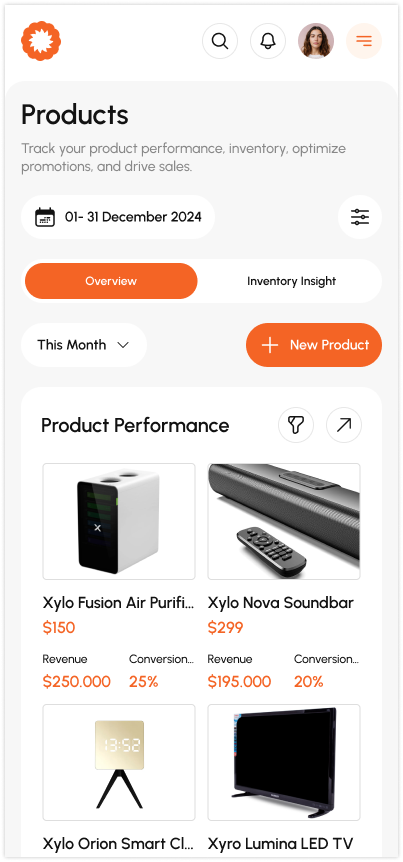
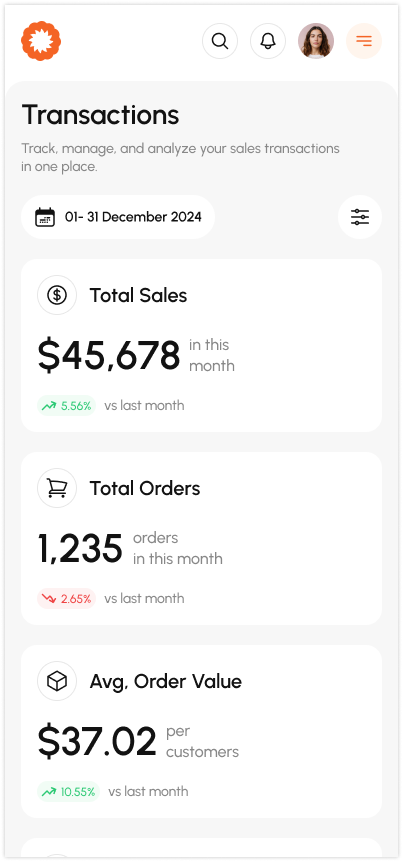
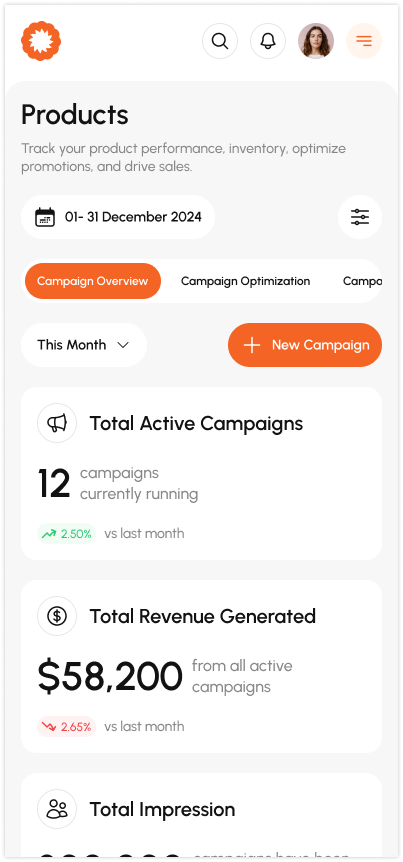
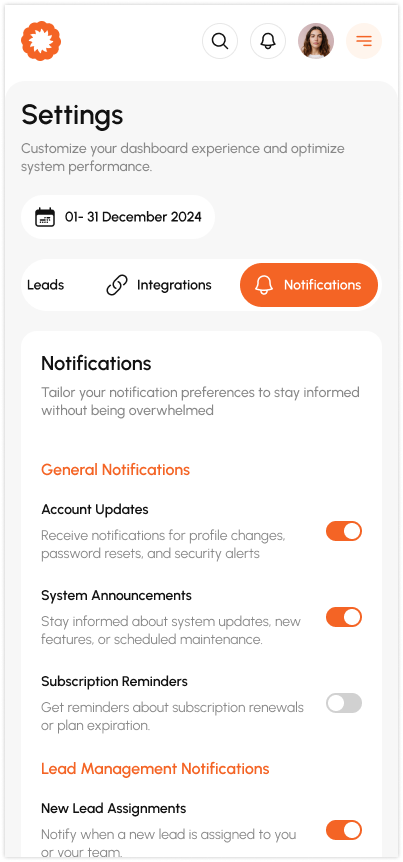
Mobile version of CRM system for marketplace
Trading on marketplaces without automation means an endless stream of orders, disparate offices, errors in balances, and a messy pricing process. Marketplace automation is critical when manual management becomes a business bottleneck, slows down growth, and increases the risk of errors. A CRM system simplifies complex processes, helping sellers scale without chaos and loss of control.
Off-the-shelf CRMs for the commodity business rarely take into account the peculiarities of trading on marketplaces – they have a rather limited set of integrations, template order processing logic, and difficulties with synchronizing balances. As a result, sellers have to adapt to the system’s capabilities, but it should be the other way around. Customized development of a management system removes many restrictions: you get a tool that is fully customized for your business – with support for the necessary platforms (Prom, Rozetka, Amazon, etc.), logistics schemes (FBS, FBO), flexible pricing, and automation of all key processes. You don’t just trade, you manage it on your own terms, so you can earn more and grow faster.
Developing CRM for marketplaces involves a consistent process of creating an intelligent system that can combine disparate business processes into a single ecosystem. Each stage matters and affects the final result.
At the initial stage of development, analysts study the specifics and key processes of the business – which marketplaces the seller works with, how they process orders and keep warehouse records. They define key performance indicators (KPIs), automation points, potential bottlenecks, and formulate requirements for the CRM system.
Based on the data obtained, a CRM concept is formed, which is described in detail in the terms of reference. This document contains information about the functionality of the future CRM system, reporting, integration, and requirements for analytical modules.
At this stage, the system architecture is created, and the connections between modules are determined. Taking into account the peculiarities of marketplaces, we develop databases, logic for processing bulk orders, algorithms for updating balances and dynamic pricing, real-time data synchronization, and API integrations. Next, we create interface prototypes to test user interaction with CRM. Prototyping tools such as Moqups, Figma, Sketch, and Adobe XD are used to create interactive mockups.
UX/UI designers develop a user-friendly and intuitive interface that simplifies the work with the system and increases sales efficiency. The design should be adapted to all devices and take into account the needs of users: operators, managers, and business owners. The interface is optimized for tasks such as order management, sales monitoring, warehouse management, and advertising campaigns.
The key stage at which programmers bring the project to life: they implement backend logic using programming languages such as Python, JavaScript, PHP, as well as React, Angular, Vue.js frameworks for the frontend part. Connect APIs of marketplaces to automatically collect data on orders, products, and balances. Integration modules with logistics services, advertising tools, and analytical systems are implemented, and algorithms for dynamic pricing and demand forecasting are prescribed.
Comprehensive testing of a CRM system for marketplaces is necessary to check its performance and compliance with customer requirements. Functional, load, usability testing and verification of the program’s compliance with security standards helps to identify and correct possible errors.
After successful testing, the system is ready for commissioning. First of all, data is transferred to it and users are trained. Then, it is deployed on the customer’s server or in the cloud storage, user roles and access levels are configured, and then a test run is performed in real conditions.
After CRM implementation, developers continue to monitor the system. Receiving feedback from users, they eliminate possible errors, finalize new modules on request, update integrations with marketplace services in case of API changes, and expand functionality based on user experience analysis and new business needs.
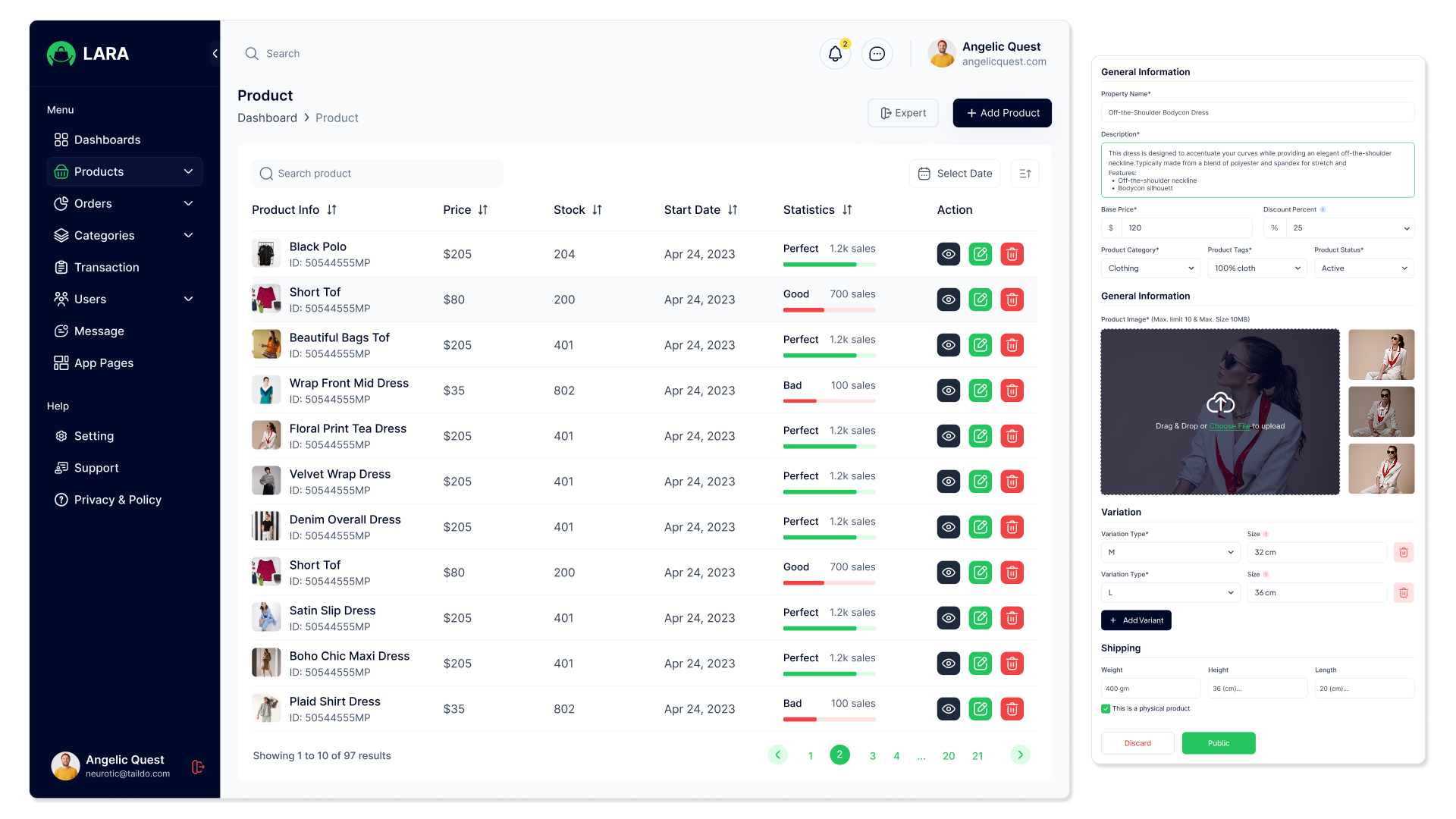
In a fiercely competitive environment, managing all processes manually is difficult and irrational, so sales automation on marketplaces has become a necessity. A custom CRM system is a tool that synchronizes key trading processes, allowing sellers to focus on business development.
AVADA MEDIA specialists create and scale CRM systems that use the latest technologies – artificial intelligence to personalize the customer experience, deep analytics to predict demand. This is not just an adaptation of the system to your current processes, but a foundation for future growth that will give you the opportunity to stay ahead of competitors and anticipate trends.
How much does it cost to develop a customized CRM system for a marketplace?
The cost of custom CRM development for a commodity business depends on the functionality, number of integrations, design and user interface requirements, as well as the implementation time.
How long does it take to develop a CRM?
The timeframe depends on the complexity of the project. On average, the development of a management system takes 4 months or more. We strive to ensure that each stage is transparent, and the customer is always aware of the progress.
How does the program simplify product catalog management?
CRM allows you to centrally edit product cards, massively update prices, descriptions, and balances on all marketplaces without having to log in to each account.
How can a CRM system for marketplaces help you work on international marketplaces?
The program can support multilingualism, allowing you to manage sales on international marketplaces, translate product content, communicate with customers in different languages, and adapt marketing campaigns to different markets.
Can I use a CRM system to manage content?
Yes, the system allows you to manage content on various marketplaces – product descriptions and characteristics, images, and videos in cards.
How does CRM help to manage affiliate programs?
A CRM system can track affiliate sales, calculate commissions, and analyze the effectiveness of cooperation.
How does the individual development of a CRM system differ from ready-made solutions?
A ready-made CRM system for Prom, Amazon, Rozetka, and other aggregators is a standard solution with limited customization. A custom-made CRM system adapts to specific business processes, works with several marketplaces at once, and is easily scalable.
How does the management system help to interact with customers?
The program integrates with chats and messengers of marketplaces, allowing you to quickly answer customer questions, advise on products, and solve problems.
How does a CPM system for a merchant help to avoid fines?
The system automatically monitors deadlines, sends notifications about the need for shipment, and integrates with logistics services, minimizing the risk of delays.
Our works
Contact the experts Have a question?
Developed by AVADA-MEDIA™
The user, filling out an application on the website https://avada-media.ua/ (hereinafter referred to as the Site), agrees to the terms of this Consent for the processing of personal data (hereinafter referred to as the Consent) in accordance with the Law of Ukraine “On the collection of personal data”. Acceptance of the offer of the Consent is the sending of an application from the Site or an order from the Operator by telephone of the Site.
The user gives his consent to the processing of his personal data with the following conditions:
1. This Consent is given to the processing of personal data both without and using automation tools.
2. Consent applies to the following information: name, phone, email.
3. Consent to the processing of personal data is given in order to provide the User with an answer to the application, further conclude and fulfill obligations under the contracts, provide customer support, inform about services that, in the opinion of the Operator, may be of interest to the User, conduct surveys and market research.
4. The User grants the Operator the right to carry out the following actions (operations) with personal data: collection, recording, systematization, accumulation, storage, clarification (updating, changing), use, depersonalization, blocking, deletion and destruction, transfer to third parties, with the consent of the subject of personal data and compliance with measures to protect personal data from unauthorized access.
5. Personal data is processed by the Operator until all necessary procedures are completed. Also, processing can be stopped at the request of the User by e-mail: info@avada-media.com.ua
6. The User confirms that by giving Consent, he acts freely, by his will and in his interest.
7. This Consent is valid indefinitely until the termination of the processing of personal data for the reasons specified in clause 5 of this document.
Send CV
Contact us in any convenient way for you:
+ 38 (097) 036 29 32